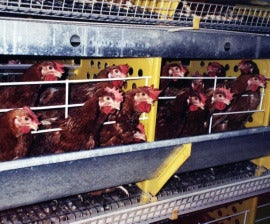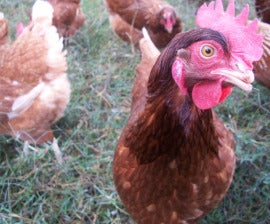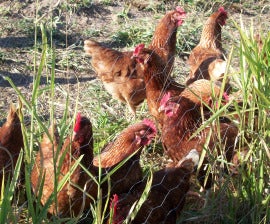-

Life in rows. Ana Maria de Andrade Mitidiero
-

No room to move around. Compassion Over Killing
-

Opportunity for natural behavior. HSI
-

Cage-free is more humane. HSI
Hens are intelligent animals who form strong family ties; yet, in Brazil, approximately 95 percent of egg-laying hens, or more than 80 million animals, are confined in battery cages so small that the birds are prevented from performing many important natural behaviors, including walking, perching, dust bathing, nesting, or even fully stretching their wings.
They suffer psychological stress as well as numerous physical harms, including bone weakness and breakage, feather loss, and diseases. Confined in battery cages, each bird has less space than a sheet of paper on which to spend her entire life.
The science supports what common sense already tells us: that animals confined in such an extreme manner endure constant suffering. Studies also show that not confining animals in cages may also improve food safety.
Alternative systems
In Brazil, there are more humane production systems that do not use cages, including free-range and organic. Not only do free-range and organic certification in the country prohibit confinement in battery cages, they also require that the birds have access to outdoor areas where they can exercise and carry out more natural behaviors, such as foraging. Another alternative are eggs labelled as “Certified Humane”. This certification does not necessarily mean that hens have access to outdoor areas, but cages are not allowed and hens are free inside sheds with areas for nesting, foraging, perching and dust-bathing.
International trend
The world is moving away from barren battery cages. In Switzerland, they have been banned for more than 20 years. In 2012, the European Union banned the use of conventional battery cages. In the same year, Bhutan also banned the confinement of laying hens in battery cages. In the U.S., the states of California, Michigan and Ohio have passed laws to restrict the confinement of egg-laying hens. In India, the world’s third largest egg producer, most states have declared that confining hens in cages is a violation of the country’s anti-cruelty legislation and a national ban is being considered.
Important multinational companies are also adopting cage-free egg purchasing policies. Burger King, Subway, and WalMart are using cage-free eggs in the United States and the European Union. Unilever announced that by 2020, all eggs used in the manufacturing of Hellmann’s mayonnaise will be cage-free globally, including in Brazil.
You can help
- Learn more about the implications of battery cages
- Read our report about the environmental impacts of industrialized animal agriculture
- Eat more humanely
- Join us! Sign up to get the latest news and action alerts
- Join our global community on Facebook
- Learn more about our work in Brazil.
